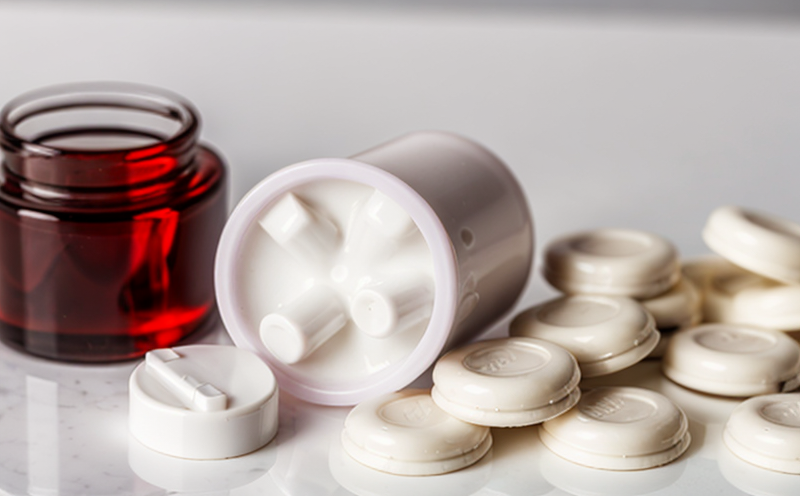USP Water Content Karl Fischer Testing
The USP Water Content Karl Fischer Test is a critical analytical method used to measure the moisture content in pharmaceutical products. This test ensures that the product meets stringent quality and regulatory standards, thereby protecting patient safety. The USP (United States Pharmacopeia) recognizes this method as an essential tool for assessing the purity of oral solid dosage forms like tablets, capsules, and powders.
The Karl Fischer titration technique is based on coulometric or volumetric analysis that quantifies trace amounts of water in a sample. The process involves introducing the sample into a sealed cell where it reacts with sulfur dioxide (SO₂) and iodine (I₂), forming pyridine and water, which are then titrated to determine the amount of moisture present.
This test is particularly important for oral solid dosage forms because even small variations in moisture content can affect drug stability, efficacy, and shelf life. Excessive moisture can lead to hygroscopicity, microbial growth, and degradation of active pharmaceutical ingredients (APIs). Conversely, insufficient moisture may result in poor tabletting properties or reduced dissolution rates.
For quality managers and compliance officers, ensuring that the water content meets USP specifications is crucial for maintaining product integrity. R&D engineers rely on this testing to optimize formulation processes, while procurement teams ensure the raw materials meet these stringent standards before incorporation into final products.
The accuracy of Karl Fischer titration depends heavily on proper sample preparation and instrument calibration. Samples are typically weighed accurately and dried if necessary to remove any residual moisture from external sources. Once prepared, the samples are introduced into the Karl Fischer cell for analysis.
Modern instrumentation used in this testing includes advanced titrators that provide precise measurements with high repeatability. The test can be automated, allowing for rapid and consistent results across multiple batches or products. Compliance officers often use these tests to verify batch release data, ensuring adherence to regulatory requirements such as those outlined in USP General Chapter General Chapter 726.
Environmental and Sustainability Contributions:
- The precision of Karl Fischer testing helps reduce waste by minimizing over- or under-processing materials, thus optimizing resource use.
- By ensuring product stability and efficacy, this test supports better patient compliance with prescribed medications.
- Precision measurements contribute to reducing the environmental impact associated with manufacturing processes that require strict controls on moisture content.
Why It Matters
The USP Water Content Karl Fischer Test is vital for maintaining high standards of quality and safety in pharmaceutical products. Ensuring accurate water content measurements prevents potential risks associated with microbial contamination, product stability issues, and efficacy concerns.
In the context of oral solid dosage forms, precise moisture control ensures consistent dosing accuracy and enhances patient compliance. Excessive moisture can lead to hygroscopic behavior, causing tablets to stick together or break during manufacturing processes. This not only increases production costs but also reduces product quality.
From a regulatory perspective, meeting USP specifications is essential for obtaining approval from relevant authorities. Non-compliance with these standards could result in recalls and damage to brand reputation. For procurement teams, ensuring that raw materials meet these stringent standards helps maintain consistency across different batches of products.
Why Choose This Test
The USP Water Content Karl Fischer Test offers several advantages over other moisture measurement techniques due to its high sensitivity and precision. It can detect trace levels of water down to parts per million (PPM), making it ideal for ensuring that even small amounts of moisture do not compromise product quality.
Compared to gravimetric methods or Karl Fischer titration using a different approach, this technique provides more accurate results, especially for samples with lower moisture content. The titrator can also be used in conjunction with other analytical tools like high-performance liquid chromatography (HPLC) or Fourier transform infrared spectroscopy (FTIR), providing comprehensive data on product composition.
Moreover, the test is relatively simple to perform and requires minimal sample preparation compared to some alternative methods. This makes it a cost-effective option for quality control laboratories that need reliable moisture content measurements without extensive laboratory equipment.





